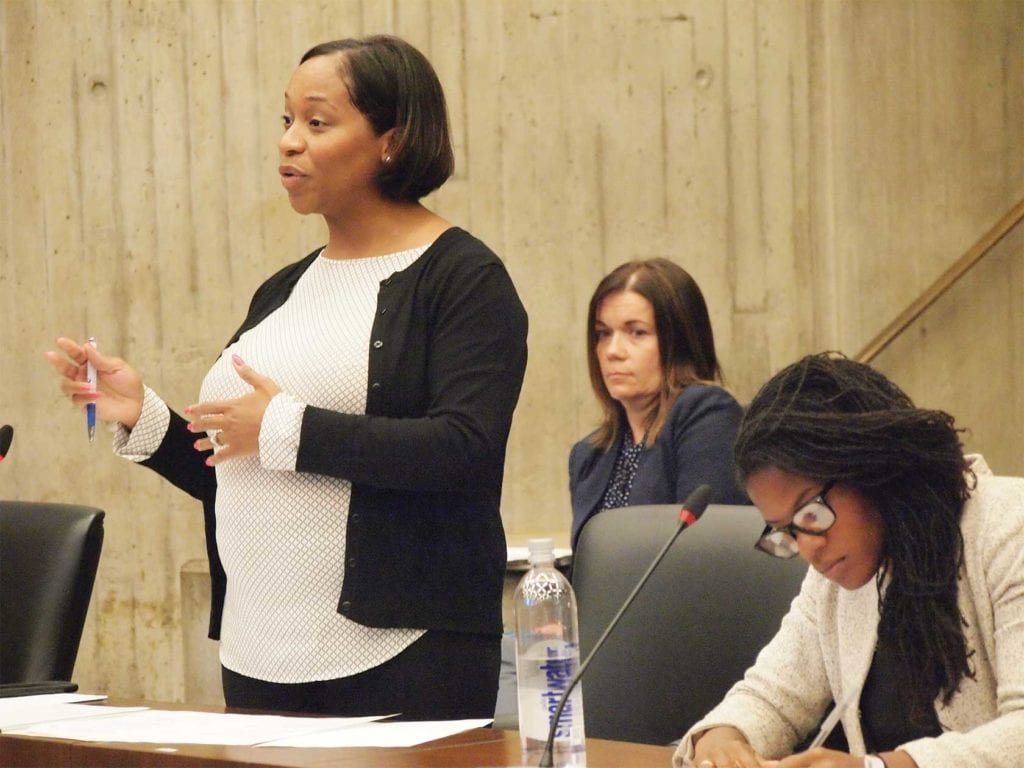Campbell calls for inspector general
Councilors express varying degrees of support

City Council President Andrea Campbell’s proposal for a city inspector general received a warm reception at last Wednesday’s council meeting, with a majority of the 13-member body signing on in support of a hearing on the measure.
The proposal comes after former Boston Planning and Development Agency official John Lynch pleaded guilty to bribery charges stemming from a $50,000 payment from a developer seeking approval for a project from the City’s Zoning Board of Appeal.
“I think we all agree that Boston deserves a city government that is free of corruption and waste, grounded in transparency and accountable to the people,” Campbell said, introducing her proposal.
Campbell said she heard the idea at a meeting of city council presidents earlier this year.
“This is position is about bringing in someone who can proactively, not reactively, look at our departments, how they spend their money, look at our policies and questions that will ensure transparency and accountability,” she said, “as well as making sure that we have good governance and good management — and that those policies that are on paper and are well-intentioned actually show up in reality.”
Campbell said the position could save the city money, given that outside investigations, such as the one Mayor Martin Walsh launched to look into the Zoning Board of Appeal after Lynch was charged with accepting a bribe, are costly.
“It’s expensive to bring in an investigation out of a law firm,” she said.
Signing on to Campbell’s order for a hearing on the inspector general position were Councilors Frank Baker, Lydia Edwards, Matt O’Malley, Kim Janey, Edward Flynn, Michael Flaherty, Annissa Essaibi-George, Michelle Wu and Josh Zakim.
At-large Councilor Althea Garrison spoke in opposition.
“We already have an inspector general for federal government, we have an inspector general for state government,” she said. “Why do we need an IG for municipal government?”
Campbell acknowledged Garrison’s comment but noted that the state’s inspector general has not responded to recent requests to investigate city matters.
“Frankly, that position is so far removed that I don’t find it to be effective when it comes to our dealings with the City of Boston,” she said.
District 3 Councilor Frank Baker signed on to the hearing order, but said he has reservations.
“I just think an office like this could really grind the working of the city to a halt,” he said.
A spokeswoman for Mayor Martin Walsh sent the Banner a statement saying he is open to additional oversight.
“Mayor Walsh welcomes a conversation about additional oversight at the City of Boston,” the statement reads, “and that’s why he has asked for an independent review of this incident and the entire ZBA. Mayor Walsh is going to take the action needed to get to the bottom of what happened here, and he’s fully committed to overhauling the Zoning Board of Appeal.”
Campbell’s proposal calls for the inspector general to be appointed to a five-year term by a seven-member board. The board would contain one member appointed by the mayor, one nominated by the president of the council, one nominated by the Ways and Means Committee chair, two members selected from a public application process and jointly selected by the city council president and Ways and Means Committee chair, one ex-officio seat reserved for the city auditor and another ex-officio seat reserved for the corporation counsel.
The position would be funded by the city with a floor on its budget to prevent the city from underfunding the position.
The inspector general would investigate complaints of waste, misconduct, fraud and corruption by city employees, elected officials and appointed officials. The inspector general would conduct reviews of city agencies, boards, commissions and quasi-governmental agencies. The role would also require issuing quarterly reports to the city council and mayor on the status of investigations and making all reports public.
Currently, the quasi-independent City of Boston Finance Commission, created under state law, reviews all unadvertised contracts over $50,000 issued by city departments, investigates complaints of potential wrongdoing and conducts research aimed at uncovering municipal inefficiencies. FinCom, as the agency is known, has an executive director, four current board members and a city-funded budget that last year was $271,275.
Recent FinCom investigations included a review of Boston Public Schools’ prepared meals contracts, a review of the city’s costs for employee health care, an ongoing review of the sale and development of the Winthrop Street Garage and yearly reviews of the city’s budget.
As is the case with Campbell’s proposed inspector general, FinCom has the power to subpoena city officials.
During last week’s hearing, Campbell said FinCom, whose head is appointed by the governor is “a bit removed from local government” and limited in the scope of its investigations.







